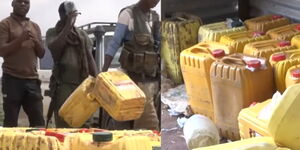The Pest Control Products Board (PCPB) has rolled out a nationwide crackdown on all pesticide products being sold in the market.
This is after a counterfeit consignment that was not registered and failing to meet the quality threshold specified by the Kenya Bureau of Standards (KEBS) was intercepted at the Port of Mombasa on Wednesday.
Speaking in Mombasa on February 7, following the interception, the PCPB Mombasa branch manager, Stanley Ng'ang'a stated that the agency will be taking precaution over the possibility that similar products might already be in the market.
"Yesterday we caught over 300,000 kg of illegal drugs (pesticides) on their way to Kabati, Kenol the importer did not have the necessary papers,"
"We received a call and an email from KRA that the container we were suspicious of, was indeed not registered, neither did it have the necessary papers for importation," Ng'ang'a stated.
Officials from the PCPB are currently visiting various agrovets and farms across the country to ensure that the products being sold are of the prescribed standards.
The agency has further raised concerns over the influx of counterfeit pesticide products in the Kenyan market, and the use of unregistered and banned pesticides.
Meanwhile owner of the cargo is still at large as the authorities mount further investigations. The seized consignment has since been moved to Kenya Ports Authority (KPA) warehouses as the relevant government agencies await further directions.
The crackdown follows an alarm raised by Human Rights Watch over banned insecticides from European countries that still find their way into the Kenyan market.
On September 13, 2023, a report by the Root to Food Initiative (RFTI) revealed that over 75% of insecticides that were being sold in the Kenyan market were highly hazardous.
Most of the products were found to be too hazardous for usage in the European country, however, they were still being exported by international companies to countries like Kenya.
"It should go without saying that pesticides considered too harmful for people living in Europe are equally harmful for those living in Kenya,” Julia Bleckner, a senior health researcher at Human Rights Watch stated.












